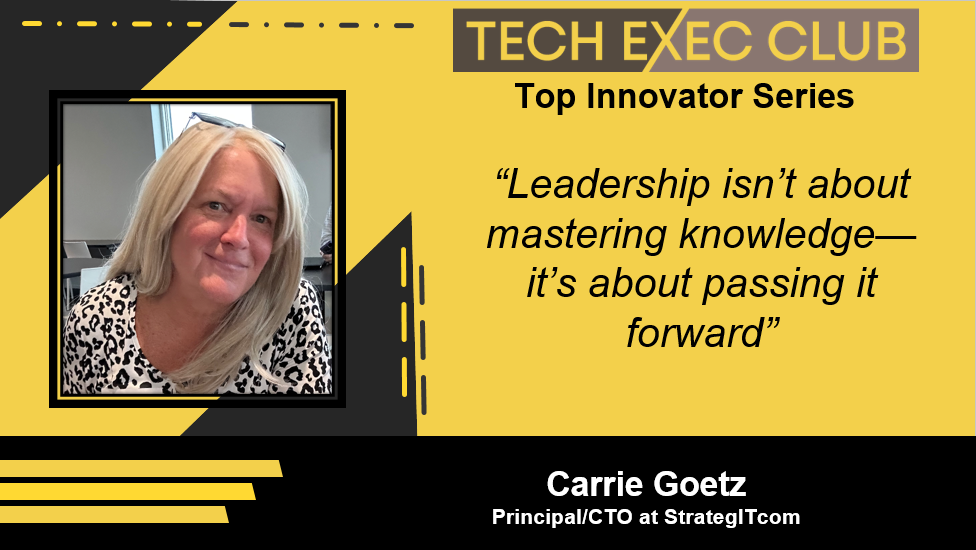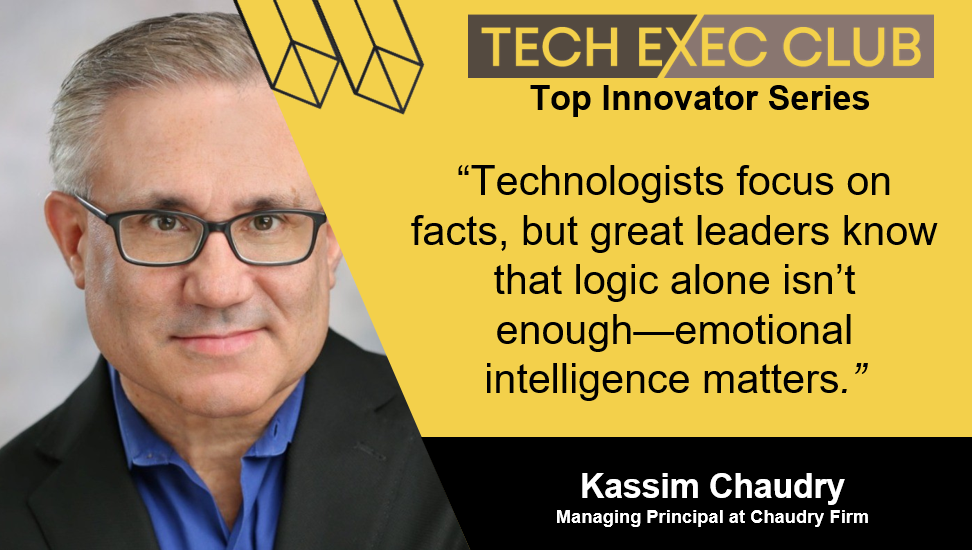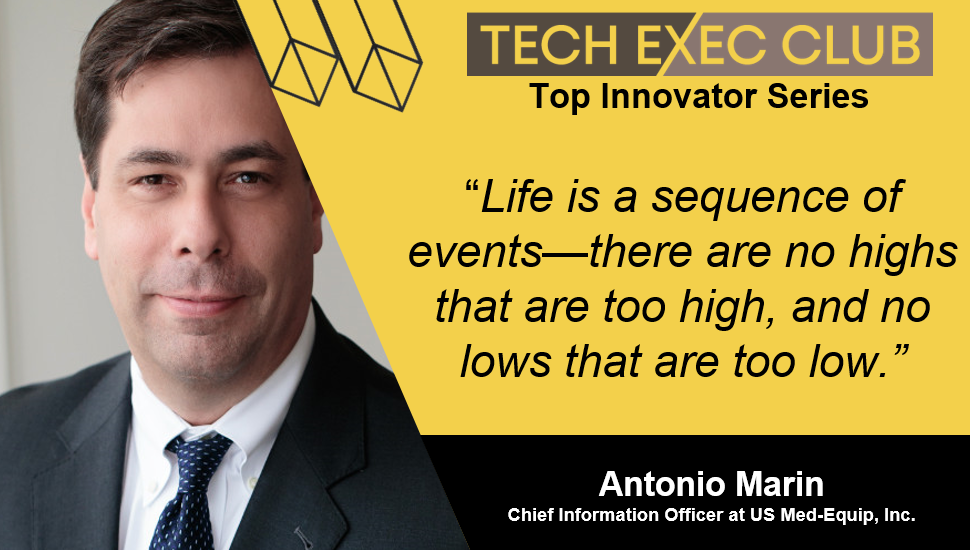Few voices resonate as powerfully as Carrie Goetz’s in the ever-evolving landscape of technology and leadership. As the CTO of StrategITcom, an accomplished author, and a sought-after keynote speaker, Carrie has spent decades pioneering strategies that blend technical expertise with human-centric leadership. Her latest book, Polly Packett’s Precious Payload, All Smiles to the Data Center, underscores her commitment to sharing knowledge and fostering meaningful conversations about tech innovation.
In an exclusive interview with Josef Martens for the Top Innovator series, Carrie provides deep insights into what makes a great tech leader. She discusses the importance of lifelong learning, the apprenticeship mindset, and the vital role of mentorship in shaping successful teams. Far from conventional leadership wisdom, her philosophy challenges traditional notions of mastery, advocating instead for an approach that embraces continuous growth and the organic transfer of knowledge.
Throughout her career, Carrie has observed firsthand how leaders succeed—and where they falter. She emphasizes that technical mastery alone isn’t enough; a great leader must cultivate a culture of shared learning, ensuring that expertise isn’t hoarded but passed along to empower others. She believes this apprenticeship model is key to sustained innovation in technology-driven industries.
This interview uncovers Carrie’s leadership lessons, her vision for the future of tech teams, and the unconventional wisdom that has made her a standout voice in the industry. She paints a compelling picture of collaborative, insightful, and unapologetically forward-thinking leadership through her insights.
The Apprenticeship Mindset in Leadership
Carrie Goetz’s leadership philosophy is built upon the foundation of the “apprenticeship mindset”—a concept that challenges the traditional belief that leadership is about mastery. Instead, she argues, great leaders never stop learning. In an industry where technology moves faster than any formal curriculum can keep up, she believes that professionals must rely on mentorship and shared expertise to stay ahead.
Her approach is simple yet profound: leadership is not about accumulating and keeping knowledge to oneself but passing it forward. Carrie likens it to an apprenticeship program, where leaders help cultivate the skills of their teams rather than dictating from a position of authority. By creating an environment where continuous learning is valued, companies can ensure that rigid hierarchies don’t stifle innovation but thrive through collaboration.
Carrie sees knowledge transfer as a responsibility, not an option. She argues that leaders who hoard knowledge limit the potential of their teams. Instead, she encourages executives to work alongside their employees, ensuring that the skills they have gained over the years don’t remain locked away but are shared generously. “You hired them for their expertise,” she says. “Let them use it.”
Her belief in the apprenticeship model extends beyond her professional life. Through speaking engagements, mentorship programs, and writing, Carrie works tirelessly to ensure that the next generation of tech professionals is skilled and empowered.
Beyond Traditional Education: Rethinking Qualifications in Tech
The tech industry has long emphasized formal education as a gateway to success, but Carrie Goetz challenges this assumption. While acknowledging that some roles require degrees, she argues that many of the best tech professionals don’t fit the conventional academic mold. Instead of relying solely on credentials, she champions a more inclusive approach, recognizing skills developed through real-world experience, problem-solving, and adaptability.
Her stance is rooted in a simple observation: technology evolves at a pace that traditional education struggles to keep up with. A four-year degree may provide foundational knowledge, but when a graduate enters the workforce, much of what they learned may already be outdated. Carrie strongly advocates for apprenticeship programs, internships, and hands-on experience as viable paths into tech careers.
She believes that meaningful diversity in the workplace doesn’t just come from demographic representation; it comes from diversity of thought, experience, and problem-solving approaches. Pairing engineers with tradespeople, for example, leads to a richer exchange of ideas. “We get different results when we bring varied perspectives together,” she explains. “Innovation doesn’t happen in isolation; it’s built through collaboration.”
Carrie has also been involved in efforts to remove unnecessary degree requirements in hiring practices. By prioritizing skills over formal qualifications, companies can tap into a broader talent pool and foster a more inclusive work environment.
The Power of Inclusion and Meaningful Diversity
Carrie Goetz has seen firsthand how companies benefit when they embrace diversity—not just in demographics but in perspectives and experiences. For her, diversity isn’t a box to be checked; it’s the key to stronger, more resilient teams.
She argues that organizations often fall into the trap of hiring people who think alike, creating echo chambers that limit creativity. The most successful teams, she says, are those that encourage a diversity of thought, allowing people with different backgrounds, problem-solving approaches, and skill sets to collaborate.
One of her favorite examples involves pairing engineers with tradespeople. Companies create practical and innovative solutions by combining technical experts with hands-on professionals. “There’s a massive difference between theory and practice,” she explains. When you combine people from different fields, you get a better product for everyone.
But inclusion isn’t just about hiring—it’s about fostering an environment where every employee feels valued and heard. Carrie emphasizes that true diversity comes from recognizing people’s strengths and ensuring they have opportunities to thrive. Whether it’s removing barriers to entry, investing in mentorship programs, or encouraging open dialogue, she believes that inclusion should be woven into the fabric of workplace culture.
The Giving Nature of the Tech Industry
The tech world is often seen as cutthroat, but Carrie Goetz describes it as one of the most generous industries for sharing knowledge. Unlike other fields where competition can lead to secrecy, technology thrives on open-source collaboration, mentorship, and knowledge exchange.
Throughout her career, Carrie has benefited from countless mentors who took the time to answer her questions, and she has made it her mission to do the same for others. One of the best pieces of advice she ever received was simple: “The only stupid question does not get asked.”
On top of the collaborative environment we have to remove the culture of fear. Sometimes mistakes lead to amazing solutions. We have to embrace the humanity of our personnel. Employers that foster the culture of fear have the worst outcomes with respect to turnover and employee satisfaction. The same holds true for the culture of fear when it comes to expressing ideas and improvements. We should encourage the questions. We need to embrace ignorance as a stepping stone to learning. There isn’t a person on earth that isn’t ignorant about something. Sometimes the questions asked lead to new features, insights, improvements, and even new products. “What if…?” is an amazing start to enlightened conversations.
In tech, curiosity is an asset. Whether learning about a new software architecture, troubleshooting network issues, or brainstorming innovative solutions, asking questions is how progress happens. Carrie believes fostering a culture where people feel comfortable seeking help is essential for growth.
She also notes that many professionals underestimate the power of networking. Sharing knowledge isn’t just about formal mentorship—it happens in casual conversations, collaborative projects, and industry events. The best leaders, she says, understand that expertise isn’t meant to be kept to oneself; it’s meant to be passed along so that the industry can collectively move forward.
Passing Knowledge Forward: The Future of Leadership
Carrie Goetz’s vision for leadership is deeply intertwined with mentorship and accessibility. She believes that leadership is not about individual success—it’s about lifting others.
She has dedicated significant time to establishing national apprenticeship programs and advocating for alternative pathways into the tech industry that don’t rely on college degrees. For her, leadership isn’t defined by titles or credentials but by the ability to nurture talent and create opportunities for others.
Carrie also sees the role of leaders evolving. The traditional top-down model, where executives dictate from above, is slowly replaced by a more collaborative, mentorship-driven approach. Today’s most successful leaders, she says, actively engage with their teams, provide guidance, and foster environments where learning never stops.
Her commitment to mentorship extends beyond her workplace. She hosts “newbie walks” at conferences and personally guides newcomers through the complexities of data centers and industry dynamics. She has also written extensively on the subject, ensuring that professionals at every level have access to insights that can help them grow.
Carrie’s focus remains clear as she looks to the future: leadership must be about accessibility, mentorship, and knowledge transfer. By adopting the apprenticeship mindset, companies can build stronger, more adaptable teams that will continue to push boundaries and redefine innovation for years to come.
If innovation is to thrive, leadership must evolve beyond tradition. Carrie Goetz challenges the status quo, advocating for mentorship, knowledge-sharing, and inclusivity in tech leadership. Here’s how you can embrace her principles to drive meaningful change in your organization:
1. Embrace Lifelong Learning: Tech innovation is constantly evolving, and leaders must cultivate a mindset of continuous education. Encourage your team to seek learning opportunities through formal training, mentorship programs, or hands-on experience.
2. Prioritize Knowledge Sharing: Leadership is not about hoarding expertise but passing it forward. Create an environment where senior professionals mentor and share insights with junior employees. Establish internal knowledge-sharing sessions, cross-functional team collaborations, and open-door policies to encourage knowledge exchange.
3. Rethink Hiring Practices: Move beyond rigid degree requirements when assessing talent. Recognize the value of hands-on experience, technical skill, and problem-solving ability. Consider apprenticeships, internships, and skill-based assessments as alternative pathways for hiring.
4. Champion Diversity of Thought: True diversity is more than demographics—it’s about varied perspectives and problem-solving approaches. Encourage collaboration between engineers, tradespeople, and professionals from different backgrounds. Pair individuals with complementary skill sets to generate new ideas and ensure that innovation stems from multiple viewpoints.
5. Encourage Open Communication: Cultivate a workplace culture where employees feel safe asking questions, sharing insights, and voicing concerns. Carrie emphasizes that curiosity is a critical leadership trait. Leaders should remove barriers that discourage employees from participating in discussions and ensure that transparency is at the core of decision-making.
6. Engage in Mentorship Programs: Mentorship is at the heart of Carrie’s leadership philosophy. Organizations should formalize mentorship opportunities, pairing experienced professionals with newcomers to the industry. Mentors should provide technical guidance and help individuals navigate career paths and professional development.
7. Support Alternative Pathways into Tech: College degrees are not the only measure of talent. Advocate for apprenticeships, alternative certifications, and experience-based learning models that allow skilled professionals to succeed without traditional credentials.
Carrie Goetz’s leadership philosophy is rooted in the belief that innovation, mentorship, and inclusivity go hand in hand. By embracing an apprenticeship mindset, she has paved the way for forward-thinking leadership and championed the importance of passing knowledge forward to empower the next generation of tech professionals.
Her work in national apprenticeships, mentorship programs, and knowledge-sharing initiatives underscores her dedication to creating a more accessible and collaborative tech industry. She challenges traditional notions of expertise, advocating for diverse perspectives and hands-on learning as the foundation for meaningful innovation.
Throughout her career, Carrie has demonstrated that leadership is not about mastering knowledge—it’s about lifting others and ensuring that learning never stops. As she continues to advocate for alternative pathways into tech, she inspires leaders and professionals to embrace curiosity, mentorship, and diversity of thought as the driving forces behind successful teams.
Her vision for leadership is clear: knowledge must be shared, opportunities must be expanded, and innovation must be nurtured through inclusion and mentorship. By embracing these principles, organizations, and individuals can contribute to a tech industry that values growth, collaboration, and meaningful impact.
Want to hear Carrie Goetz’s insights firsthand? Watch the full, live podcast interview [click here]





